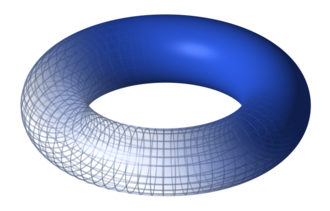Algebraic topology
Algebraic topology is a branch of mathematics that uses tools from abstract algebra to study topological spaces. The goal is to find algebraic invariants that classify topological spaces up to homeomorphism, though usually most classify up to homotopy equivalence. While geometry has to do with local properties of shapes, algebraic topology focuses on the global properties of spaces. It provides a bridge between the study of topology and the study of algebra.
Overview
Algebraic topology starts with the definition of complex structures such as simplicial complexes and CW complexes, which help in constructing spaces that are intricate and difficult to study using standard topological methods. From these structures, algebraic invariants like homotopy groups, homology groups, and cohomology groups are derived. These invariants, being algebraic, can be studied and compared more easily than the topological spaces themselves.
Homotopy Groups
Homotopy groups are fundamental invariants in algebraic topology. The first homotopy group, or the fundamental group, captures information about loops in a space. Higher homotopy groups record information about spheres of higher dimensions embedded in a space. These groups help in understanding the shape of a space in terms of its loops and voids.
Homology and Cohomology
Homology groups and cohomology groups are other crucial invariants in algebraic topology. Homology provides a way to count the number of holes of different dimensions in a space, while cohomology offers a dual perspective, focusing on spaces' properties and their functions. Cohomology also has a rich algebraic structure that lends itself to powerful tools like cup products, which provide information about the intersection of subspaces.
Applications
The applications of algebraic topology are vast and varied. In mathematics, it is used to solve problems in many other areas such as differential geometry, number theory, and dynamical systems. Outside of mathematics, it finds applications in computer science, particularly in data analysis and visualization, where topological methods are used to understand the shape of data. It is also applied in physics, especially in the study of quantum field theory and string theory, where the properties of space and time are of fundamental interest.
Key Concepts
- Simplicial complex: A building block for constructing topological spaces, made up of vertices, edges, triangles, and their higher-dimensional analogs.
- CW complex: A type of topological space that is constructed by gluing together cells of different dimensions.
- Fundamental group: An algebraic structure that captures information about loops in a space.
- Homology group: An invariant that counts the number of holes in different dimensions within a space.
- Cohomology group: A mathematical concept that provides a way to study spaces and mappings between them using algebraic methods.
- Cup product: An operation in cohomology that reflects the intersection properties of subspaces.
See Also
This article is a mathematics-related stub. You can help WikiMD by expanding it!
Transform your life with W8MD's budget GLP-1 injections from $125.
W8MD offers a medical weight loss program to lose weight in Philadelphia. Our physician-supervised medical weight loss provides:
- Most insurances accepted or discounted self-pay rates. We will obtain insurance prior authorizations if needed.
- Generic GLP1 weight loss injections from $125 for the starting dose.
- Also offer prescription weight loss medications including Phentermine, Qsymia, Diethylpropion, Contrave etc.
NYC weight loss doctor appointments
Start your NYC weight loss journey today at our NYC medical weight loss and Philadelphia medical weight loss clinics.
- Call 718-946-5500 to lose weight in NYC or for medical weight loss in Philadelphia 215-676-2334.
- Tags:NYC medical weight loss, Philadelphia lose weight Zepbound NYC, Budget GLP1 weight loss injections, Wegovy Philadelphia, Wegovy NYC, Philadelphia medical weight loss, Brookly weight loss and Wegovy NYC
|
WikiMD's Wellness Encyclopedia |
| Let Food Be Thy Medicine Medicine Thy Food - Hippocrates |
Medical Disclaimer: WikiMD is not a substitute for professional medical advice. The information on WikiMD is provided as an information resource only, may be incorrect, outdated or misleading, and is not to be used or relied on for any diagnostic or treatment purposes. Please consult your health care provider before making any healthcare decisions or for guidance about a specific medical condition. WikiMD expressly disclaims responsibility, and shall have no liability, for any damages, loss, injury, or liability whatsoever suffered as a result of your reliance on the information contained in this site. By visiting this site you agree to the foregoing terms and conditions, which may from time to time be changed or supplemented by WikiMD. If you do not agree to the foregoing terms and conditions, you should not enter or use this site. See full disclaimer.
Credits:Most images are courtesy of Wikimedia commons, and templates, categories Wikipedia, licensed under CC BY SA or similar.
Contributors: Prab R. Tumpati, MD


